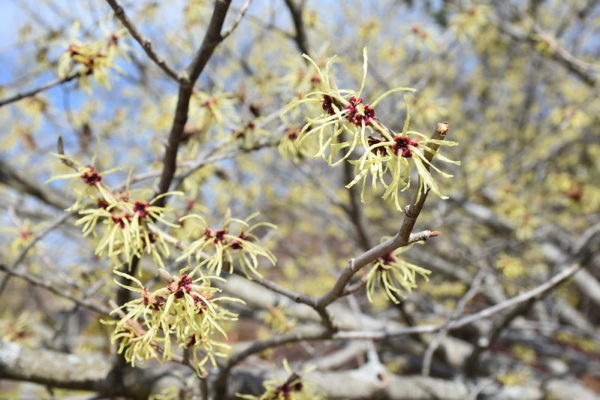
By Ruth Seward
When planting with the intention of adding color for a winter time New England garden, consider witch hazel as an option. There are four main varieties of witch hazel: American Witch Hazel (Hamamelis virginiana) which grows best in zones 4-8 and has wispy yellow flowers that are fragrant; Ozark Witch Hazel (Hamamelis vernalis) that is native to Missouri and Arkansas; Japanese Witch Hazel (Hamamelis japonica) that is zoned 5-8 and has red hanging flowers; and Chinese Witch Hazel (Hamamelis mollis) which is also zoned 5-8 and has fragrant red flowers. All varieties bloom in New England between late fall and late winter, making them delightful to see when much of our landscape is dormant and brown.
American Witch Hazel (Hamamelis virginiana) is a multi-stemmed woody plant with lovely arched shape that matures generally to 12 – 15 feet tall. Native to North America, American Witch Hazel grows best in zones 4-8. However, it can grow as far north as Maine, down to southern Florida and as far west as Texas and Minnesota. In New England, it blooms in late fall. It is a deciduous plant that does best when planted in north facing parts of a garden. It prefers partial shaded areas since it is found as an understory plant in its natural habitat. It is hearty and generally resistant to pests and disease, making it easy to care for. Pruning this shrub before summer, ensures that it will bloom in the fall.
Many of us have heard of American Witch Hazel because of modern medicinal and skin care products that are made from this plant. Native Americans used witch hazel for all types of products including remedies for skin problems and ailments. They brewed teas from the plant to treat dysentery and colds. They used tinctures to help reduce skin swelling and as an antiseptic. They utilized the seeds for food. Today, we still find witch hazel in products such skin toner and skin astringent. Most commercial commodities are derived after the plant has been distilled with alcohol. Medicinal usage of this plant has been approved by the FDA.
For me, Witch Hazel is a humble plant that offers so many benefits to a New England gardener. I enjoy its presence in my home garden and delight in its winter ornamentation at New England Botanic Garden at Tower Hill.
